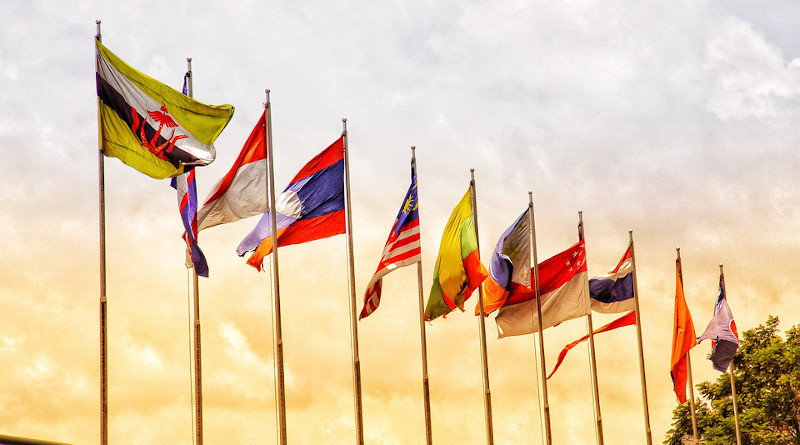ASEAN’s Redundancy In Indo-Pacific Geopolitical Powerplay 2021 – Analysis
Perceptually in 2021, ASEAN as a reputed regional grouping of long-standing faces prospects of geopolitical redundancy as ASEAN dithers in siding with the coalescing of Major Powers of the Indo-Pacific led by United States, in varying combinations, aimed at ‘China Deterrence’. Needless to highlight, that the first victims of Communist China’s military expansionism aggression were ASEAN member nations of Vietnam and the Philippines.
Geopolitical power-play in motion against Communist China in 2021 in Indo-Pacific offers no political or strategic space for ASEAN as a regional grouping ostensibly an economic grouping but essentially with security under-pinning to indulge in non-alignment. Even India the most prominent proponent of Non-alignment policies for decades has cast its strategic preferences with United States-led QUAD as some sort of insurance against the ‘China Threat’.
ASAEN long used to Communist China’s ‘Soft Power’ strategies failed to recognise that especially with the advent of Chinese President Xi Jinping in 2013 a major switch to ‘Hard Power’ use against Communist China’s peripheries had commenced.
ASEAN seems to have been shell-shocked that ASEAN which had contrived various ASEAN forums/ mechanisms to integrate Communist China as a responsible stakeholder in ASEAN stability and security should have back-stabbed ASEAN by indulging in persistent grabbing of ASEAN member-states territories, namely those of Vietnam and the Philippines.
Communist China has been successful in sowing ‘Internal Divisions’ within ASEAN as evident from ASEAN’s reluctance to brand Communist China as the aggressor state in South China Sea against Vietnam and the Philippines. Noticeably silent were the major ASEAN Nations of Indonesia and Malaysia who opened themselves to charges of ‘fence sitters’ shirking from principled stands against South China Sea aggression by Communist China.
Even when The Hague Tribunal had ruled against Communist China’s claims of sovereignty over the South China Sea in a case filed by the Philippines, SEAN noticeably failed to vociferously to highlight Communist China’s irredentist claims over South China Sea.
The major question therefore arises, and a crucial one at that, is as to how long can ASEAN afford to be silent on Communist China’s aggression against ASEAN Member States? How long can ASEAN afford to be an idle spectator on the rumblings geopolitical power-play mushrooming in the Indo-Pacific?
Presently, no optimistic indicators hover over the horizon to suggest that ASEAN will gather its political sinews to outrightly condemn Communist China in its military aggression against Vietnam and the Philippines and further transgressions in ‘mission-creep’ towards maritime domains of Malaysia and Indonesia.
On the question of ASEAN opting for United States-led security-oriented groupings like QUAD or any other version of it, it can be assessed that sooner than later ASEAN would be forced into a corner by the sheer pressure of geopolitical power-play on the maritime littorals of ASEAN Nations.
South East Asia as a geostrategic entity or a strategic sub-system of the Indo-Pacific before ASEAN took firm shape was alive to Communist China threat to its security and stability. Malaya faced serious Communist China generated insurgency across Peninsular Malaya for years. Indonesia was the locale for Communist China generated violent Indonesians versus Chinese population racial riots.
Decades ago South East Asia depended for its security on the Five Power Defence Agreement comprising Australia, Malaysia, New Zealand, Singapore and the United Kingdom.
The FPDA was formed in 1971and continues to exist in 2021 though with a lower profile, overtaken by the more high profile Indo-Pacific ‘China Threat’ groupings taking shape. It needs to be pointed out that FPDA took care of Malaysia and Indonesia China-centric perceived threat perceptions. That both these nations have not repudiated FPDA even as its 50th Anniversary approaches and where Communist China’s South China Sea claims are now touching shores of Malaysia in Borneo and of Indonesia, it is hoped that these ‘fence-sitters’ would now expectedly become hyper-active in rallying AEAN as the regional grouping to emerge more vocally on the ‘China Treat’ to Indo-Pacific security and stability.
It is also worth pointing out that it is not that ASEAN Nations, other than Vietnam and Philippines are not alive to the China Threat especially after South China Sea claims by Communist China. Individually, there has been a noticeable trend by even Malaysia and Indonesia towards enhanced naval build-up including submarines and maritime surveillance craft. But what is lacking is a sustained ASEAN effort as the regional grouping to assert itself in the strategico-military sense.
Before rounding off, it would be fair to point out that ASEAN as a regional organisation has recently displayed ‘double standards’ in its policy approaches to contentious issues. ASEAN blocked Myanmar leadership from attending the recent ASEAN Summit but ASEAN is loath to indict Communist China’s aggression in South China Sea against ASEAN Nations, namely Vietnam and the Philippines.
Concluding, it needs to be stressed that ASEAN to continue with a credible reputation capable of addressing security and stability challenges facing South East Asia needs to ‘stand up to China” and be alive to the ‘China Threat’ that is already a potent threat at ASEAN’s doorsteps. ASEAN toying with strategic ambiguities and dithering on Communist China’s aggressive expansionism impacting ASEAN Nations sovereignty will only ensure its redundancy” in the Indo-Pacific fast moving geopolitical powerplay.

